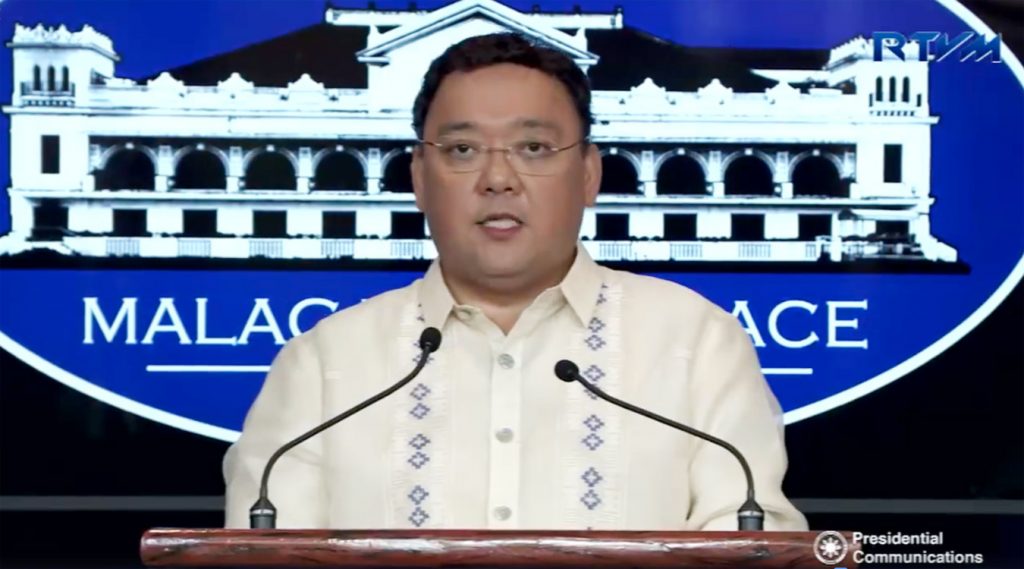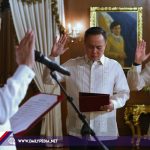- Palace reiterates joint explorations in Exclusive Economic Zones allowed
- Presidential Spokesperson Harry Roque Jr. in a Palace press briefing provided examples of ongoing joint explorations in different Exclusive Economic Zones (EEZs) by countries like China, Vietnam, Brunei, Malaysia, and Indonesia, among others.
Malacañang on Monday, March 5, reiterated that joint explorations with other claimant countries of the West Philippine Sea are allowed by law, stressing that it would not be the first time countries with contesting territorial claims entered into joint developments of disputed areas.
Presidential Spokesperson Harry Roque Jr. in a Palace press briefing provided examples of ongoing joint explorations in different Exclusive Economic Zones (EEZs) by countries like China, Vietnam, Brunei, Malaysia, and Indonesia, among others.

These include a Joint Exploration of the Beibu Gulf by Chinese state corporation CNOOC and Vietnam’s state oil company PetroVietnam; and also a Joint Oil Exploration of Blocks in South China Sea by ONGCIndia and PetroVietnam.
Roque also made mention of joint development, management, or operation agreements entered into by China’s CNOOC with other claimant countries like Indonesia and Brunei.
“All these joint exploration agreements mean that if ever we enter into a joint exploration and development agreement, it wouldn’t be the first in the world. As in fact, CNOOC already has existing joint exploration agreements even with Vietnam,” Roque noted.
The Spokesperson further said the government could look into the Vietnamese-Chinese treaty on joint exploration and development as a model for a possible agreement between the Philippines and China.
Roque then reiterated the Palace’s stand that conducting joint explorations and exploitations of EEZs with foreign entities is allowed under the country’s laws.
“They’re wrong in saying it’s not allowed under our Constitution. And they’re also wrong in saying that you’re compromising sovereignty, our point being it’s being done,” he said.
“There’s actually so many of these kinds of agreements now. It’s actually a common accepted practice for sovereign states to enter into these treaties, allowing joint development, and allowing different corporations to enter into service contracts,” he added.
Roque cited anew the case of La Bugal B’Laan Tribal Association Inc. vs. Ramos, in which the Supreme Court stated that foreign corporations are allowed to participate in exploration and development of natural resources even within the country’s land territory.
“[E]ven if it is mining in land territory, the decision said you could allow foreigners to engage in exploration and exploitation of mineral resources even in areas subject to complete sovereignty… How much more in an area where there is only sovereign rights,” Roque noted.
On the other hand, the Cabinet official clarified that before conducting joint explorations with foreign entities, the Philippines must first enter into treaties with the other participating states.
“First, there must be a bilateral treaty between the states that would enable its nationals to engage in joint exploration. Once the treaty is signed, then the service contracts are awarded in favor of corporations of the contracting states,” he explained.
He added that any such agreements must spell out the respective rights and obligations of parties involved by way of a compromise. He said in areas where both countries claim sovereign rights, they should contract as sovereign equals and observe the principle of equality under international law.
Pres. Duterte skips ASEAN-Australia Summit to attend PMA Grad
During the same press briefing, Malacañang announced that President Rodrigo Roa Duterte will not be attending the Association of Southeast Asian Nations (ASEAN)-Australia Summit this month, stressing that key developments at home require the Chief Executive’s presence.
Among the events that the President needs to attend is the Philippine Military Academy (PMA) graduation.
He said President Duterte considers the event as “an opportunity to have a dialogue with younger military officers, particularly on the manner by which the Philippine government and the military will deal with the problem of modern-day terrorism.”
However, Roque clarified that the President continues to consider the ASEAN-Australian Summit as an important occasion, designating Foreign Affairs Secretary Alan Peter Cayetano as his special personal representative.
“The special designation will help ensure that the Philippines continues to be engaged with ASEAN and Australia in advancing shared interests in the region and moving forward the common agenda for greater security, stability, and inclusive and sustainable development in the region,” Roque said.



